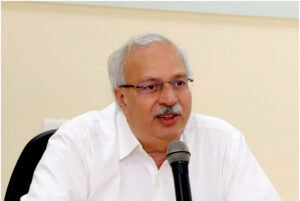NE BUSINESS BUREAU
NEW DELHI, SEPT 12
The banking sector needs to increase focus on the artificial intelligence (AI) strategy, data management, internal digitisation, talent creation and developing safe systems, the Institute for Development and Research in Banking Technology (IDRBT) said on Friday.
Established by the Reserve Bank of India (RBI) in 1996, IDRBT spearheads efforts in providing state-of-the-art technologies for the country’s banking and financial sector.

Underlining the role and potential of AI in transforming India’s BFSI sector, IDRBT released a ‘white paper’ titled “AI in Banking: A Primer” in association with Microsoft India at an event on Friday.
Saurabh Mishra, Joint Secretary, Dept. of Financial Services, Ministry of Finance, Government of India released the White Paper, at an event organised by the IDRBT for the Board members of banks, in the presence of Microsoft India executives, on Friday
The paper aims to support banks in their AI journey, recommends a framework and strategy for the successful adoption of the technology.
It stresses the urgent need for banks to assess their AI readiness using an AI maturity model and increase focus on the AI strategy, data management, internal digitisation, talent creation, and developing safe systems. It also introduces an AI maturity assessment model developed by Microsoft.
IDRBT in association with Microsoft has worked out a framework and strategy for the successful adoption of AI for accelerated innovation and growth, according to a statement.
“IDRBT urges the BFSI (banking, financial services and insurance) organisations to increase focus on the AI strategy, data management, internal digitisation, talent creation and developing safe systems to improve their AI readiness,” it said.
AI is the collection of data, algorithms, and computing power to enable machines to emulate human capabilities and act with higher levels of intelligence.
IDRBT Director A S Ramasastri said that in the coming years, artificial intelligence in banking is expected to be as normal as using any office productivity tools. “AI in combination with cloud computing, IoT (internet of things), blockchain, 5G and emerging technologies will increase customer experience and agility in the product release. We are confident these technology collaborations will draw synergies across stakeholders,” Ramasastri said.

In the foreword to the paper, Microsoft India President Anant Maheshwari said the new normal has accelerated data and AI adoption manifold, and this has clearly shown the benefits of investing in a tech-enabled future. This is enabling organisations, individuals and governments across the country and the world to not only rebound stronger from the crisis but to reimagine a new future.
“The banking and financial services industry has been at the heart of this change. A critical determinant of India’s economic success, we’ve seen the sector embrace large-scale digital transformation in the past few months, paving the way for the future of banking in India,” he said.
Maheshwari further said creating an AI-ready ecosystem that enables everyone to leverage the technology for productivity and growth is imperative for India to leapfrog into the future.
AI in banking also showcases successful use cases of public and private banks in the country that are already deploying the technology effectively. These include State Bank of India, Punjab National Bank, Bank of Baroda, ICICI Bank, HDFC Bank, and Citi Bank, the release said.
AI is demonstrating a huge impact for the early adopters at three fundamental levels the processes they adopt, their products and services and user experience, it added.
The paper said there are some challenges that need to be addressed to increase the adoption of AI in the Indian banking and finance industry. These include training existing manpower in new skills, making the current banking processes adaptable with AI, increasing the capacity of customers to use AI systems, and ensuring data protection and privacy.









